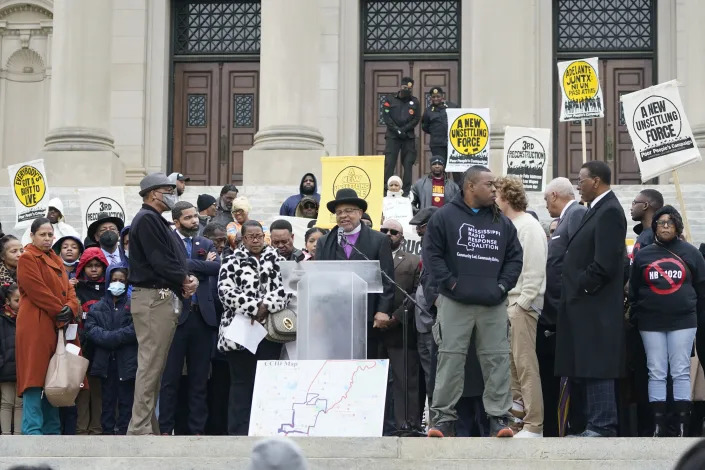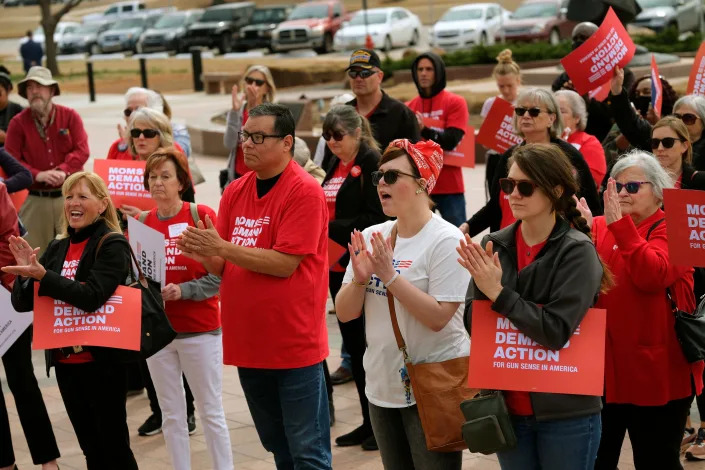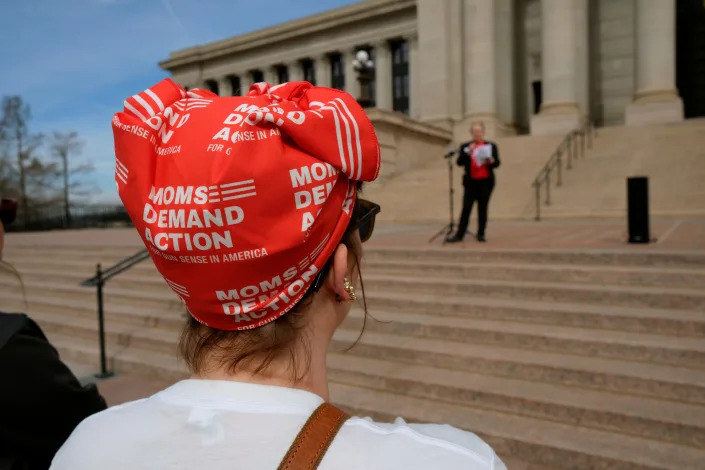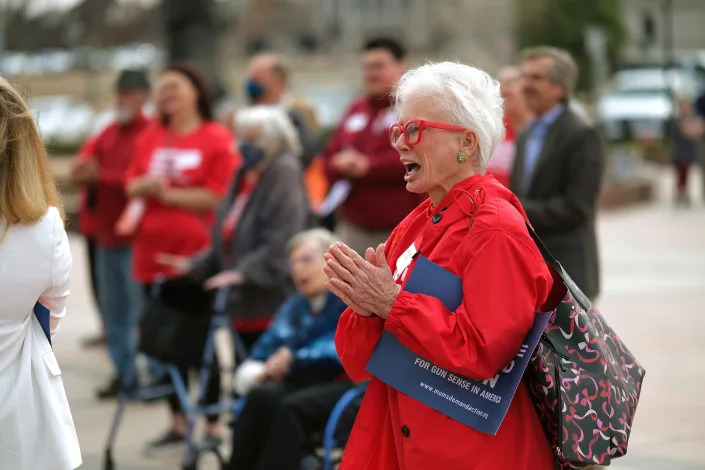
More than 200 people gather on the steps of the Mississippi Capitol on Jan. 31, 2023, to protest against a bill that would expand the patrol territory for the state-run Capitol Police within the majority-Black city of Jackson and create a new court system with appointed rather than elected judges.
(AP Photo/Rogelio V. Solis, File)
EMILY WAGSTER PETTUS
Tue, March 7, 2023
JACKSON, Miss. (AP) — The majority-white and Republican-led Mississippi Senate voted Tuesday to pass its version of a bill that would allow an expanded role for state police and appointed judges inside the majority-Black capital city of Jackson, which is led by Democrats.
“It is vastly improved from where it started, but it is still a snake,” Democratic Sen. John Horhn of Jackson said of the bill during Tuesday’s debate.
Critics say that in a state where older African Americans still remember the struggle to gain access to the ballot decades ago, the bill is a paternalistic attempt to intrude on local decision-making and voting rights in the capital, which has the highest percentage of Black residents of any major U.S. city.
The Mississippi House — which is also majority-white and Republican-led — passed the first version of the bill last month. The House version would have created two permanent new courts inside Jackson with judges appointed by the Mississippi Supreme Court chief justice. The current justice is a conservative white man.
Jackson Mayor Chokwe Antar Lumumba, who is Black, said the proposal reminds him of apartheid.
The Senate voted 34-15 to pass its revised version of the bill Tuesday, with Republicans in favor and Democrats opposed.
Supporters of the bill say they are trying to improve public safety in Jackson, which has had more than 100 homicides during each of the past three years.
“We all know the nation is watching. They have been,” Republican Sen. Brice Wiggins of Pascagoula said before Tuesday’s Senate vote. “And with this bill, we are standing up for the citizens of Jackson and for our state capital.”
The bill returns to the House, which could accept the Senate changes or seek final negotiations in the next few weeks.
Republican Gov. Tate Reeves has decried crime in Jackson but has not said whether he would sign the bill if it lands on his desk.
The Senate version removed the permanent new courts. Instead, it would allow the chief justice to appoint one judge to work within the existing court system through December 2026.
Hinds County, which is home to Jackson, currently has four elected circuit court judges who handle criminal and civil cases. Mississippi is already spending some of its federal COVID-19 relief money to pay for four appointed judges to temporarily help the elected judges in Hinds County with a backlog of cases that developed when courts were closed because of the pandemic. The Senate version of the bill would add a fifth appointed temporary judge.
The Senate version also would authorize the state-run Capitol Police to patrol the entire city of Jackson. Currently, Capitol Police officers patrol in downtown and some nearby neighborhoods where state government buildings are located. Officers from the city-run Jackson Police Department patrol the entire city.
The House version of the bill would have expanded Capitol Police territory into affluent parts of Jackson, including shopping areas and predominantly white neighborhoods — but not into the entire city.
Arkela Lewis, whose 25-year-old son Jaylen Lewis was shot to death by Capitol Police last year, told lawmakers Monday that the proposal to expand the territory of the state-run police department terrifies and angers her.
EMILY WAGSTER PETTUS
Tue, March 7, 2023
JACKSON, Miss. (AP) — The majority-white and Republican-led Mississippi Senate voted Tuesday to pass its version of a bill that would allow an expanded role for state police and appointed judges inside the majority-Black capital city of Jackson, which is led by Democrats.
“It is vastly improved from where it started, but it is still a snake,” Democratic Sen. John Horhn of Jackson said of the bill during Tuesday’s debate.
Critics say that in a state where older African Americans still remember the struggle to gain access to the ballot decades ago, the bill is a paternalistic attempt to intrude on local decision-making and voting rights in the capital, which has the highest percentage of Black residents of any major U.S. city.
The Mississippi House — which is also majority-white and Republican-led — passed the first version of the bill last month. The House version would have created two permanent new courts inside Jackson with judges appointed by the Mississippi Supreme Court chief justice. The current justice is a conservative white man.
Jackson Mayor Chokwe Antar Lumumba, who is Black, said the proposal reminds him of apartheid.
The Senate voted 34-15 to pass its revised version of the bill Tuesday, with Republicans in favor and Democrats opposed.
Supporters of the bill say they are trying to improve public safety in Jackson, which has had more than 100 homicides during each of the past three years.
“We all know the nation is watching. They have been,” Republican Sen. Brice Wiggins of Pascagoula said before Tuesday’s Senate vote. “And with this bill, we are standing up for the citizens of Jackson and for our state capital.”
The bill returns to the House, which could accept the Senate changes or seek final negotiations in the next few weeks.
Republican Gov. Tate Reeves has decried crime in Jackson but has not said whether he would sign the bill if it lands on his desk.
The Senate version removed the permanent new courts. Instead, it would allow the chief justice to appoint one judge to work within the existing court system through December 2026.
Hinds County, which is home to Jackson, currently has four elected circuit court judges who handle criminal and civil cases. Mississippi is already spending some of its federal COVID-19 relief money to pay for four appointed judges to temporarily help the elected judges in Hinds County with a backlog of cases that developed when courts were closed because of the pandemic. The Senate version of the bill would add a fifth appointed temporary judge.
The Senate version also would authorize the state-run Capitol Police to patrol the entire city of Jackson. Currently, Capitol Police officers patrol in downtown and some nearby neighborhoods where state government buildings are located. Officers from the city-run Jackson Police Department patrol the entire city.
The House version of the bill would have expanded Capitol Police territory into affluent parts of Jackson, including shopping areas and predominantly white neighborhoods — but not into the entire city.
Arkela Lewis, whose 25-year-old son Jaylen Lewis was shot to death by Capitol Police last year, told lawmakers Monday that the proposal to expand the territory of the state-run police department terrifies and angers her.

























